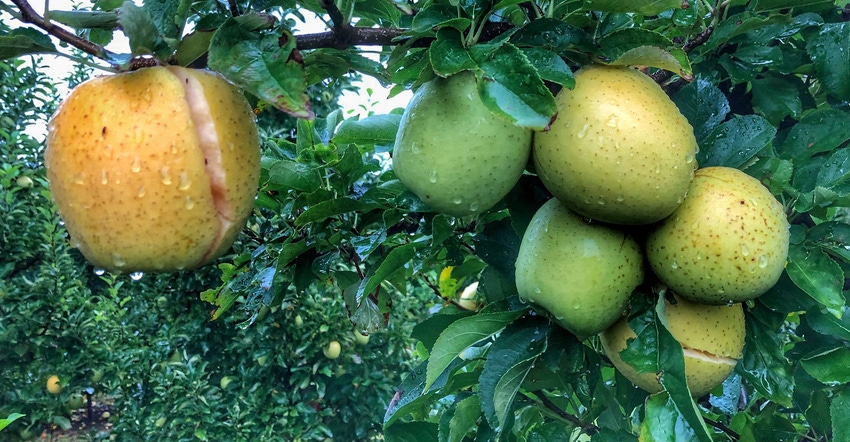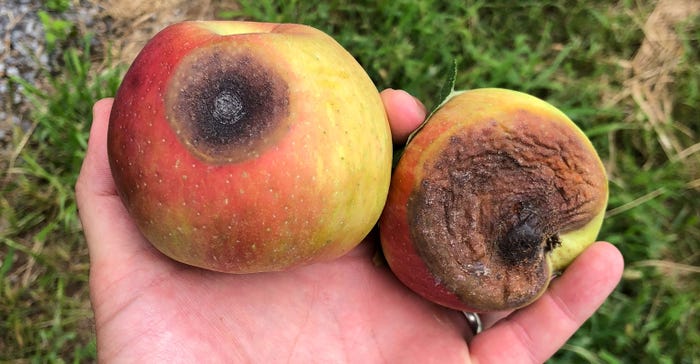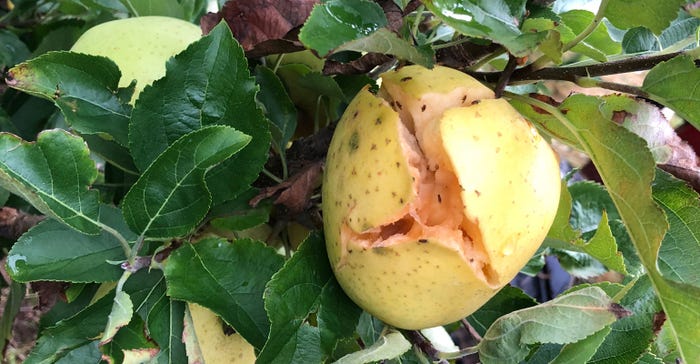
Fruit grower Bruce Hollabaugh is ready to turn the page on 2018.
It started in early August with what he describes as the worst hail storm to ever hit his family's farm in Biglerville, Pa.
"Because of its timing, in 10 minutes the storm reduced our peach crop by 75%, small fruits by 50% to 60%, pears by 50% and apples by about 35%," says Hollabaugh, the farm's production and field personnel manager.
Rain fell the entire month of August and early September, causing an "explosion" of fire blight that claimed thousands of trees.
This was the story of the 2018 growing season for many growers in Adams County, home of Pennsylvania's fruit belt. Brenda Briggs, vice president of marketing for Rice Fruit Co., says the company is seeing 25% less apples this year from the 35 growers they get fruit from. Briggs says growers dealt with three times the normal amount of rainfall this season, affecting such varieties as Red Delicious, Golden Delicious, Galas and others.
Honeycrisp, which has become the crown jewel of fresh-market apples, was especially hard hit, Briggs says, even though early August varieties were unscathed.
"The early Honeys came in around the second week of august, but it was the regular strains of September Honeys that got affected the most; 50% of that fruit," she says. "So that was the one that was a real heartbreaker."
Lots of damaged trees
Hollabaugh Brothers grows 350 acres of fruit, 125 acres of apples. Bruce Hollabaugh says fire blight destroyed at least 12,000 trees, with the possibility of up to 15,000 trees by the time harvest is completely wrapped up.
"We're prematurely removing 18 acres of apples that were in the prime of their life due to the disease," he says. "Until we clean up the rest of the orchards, it likely will cost us close to 20% of our producing apple trees."
 DISEASE DILEMMA: The rains created perfect conditions for diseases such as fire blight to thrive.
DISEASE DILEMMA: The rains created perfect conditions for diseases such as fire blight to thrive.

The constant rain, he says, created conditions that were nearly impossible to work in "or caused permanent destruction to the orchard floor due to working in so much mud."
He says many acres were submerged in water for weeks, causing even more damage.
Moving on
Hollabaugh says crop insurance likely won't help this year since their catastrophic coverage only covers crop losses above 50%.
The Farm Service Agency's Tree Assistance Program, authorized by the 2014 Farm Bill, helps cover the cost to replant trees, bushes and vines lost to natural disasters so long as there is 15% mortality in a stand.
It covers up to 1,000 acres on a farm and growers can get up to 65% of the cost to replant trees.
Still, Hollabaugh says replanting will be costly since his high-density orchards cost $14,000 to $20,000 per acre depending on the variety.
Storage concerns
Briggs says there are concerns about storage due to many apples already being in bad shape. The worst apples, she says, will be shipped to processors that make them into applesauce and other products, but the end price is lower for the grower.
Controlled-atmosphere storage facilities are vital to fresh-market production. Apples are placed in rooms where oxygen levels are dropped, essentially putting the apples to sleep. The idea is to preserve the freshness of apples for long periods of time before they go out to area stores.
 DAMAGE DONE: The 2018 growing season will prove costly for many growers in Adams County.
DAMAGE DONE: The 2018 growing season will prove costly for many growers in Adams County.

With many apples cracked and waterlogged, Briggs says the concern is that much of the crop won't make it through long-term storage.
"We don't really know what the fruit will be like three or four months down the road, but we'll keep working through it," she says.
About the Author(s)
You May Also Like






